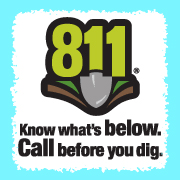It's a Gas Energy Science-SMART! Home
Do the Safe Thing
Help Prevent Gas Leaks
 If people dig into natural gas pipelines, the gas can leak out and become a fire hazard. So if you or someone you know is planning a digging project, be sure to call the utility locator service at 811 several days before digging—at least 72 hours in Maine, Massachusetts and New Hampshire, not counting weekends and legal holidays. This service makes sure underground gas pipelines and other utilities are clearly marked so people can dig a safe distance away.
If people dig into natural gas pipelines, the gas can leak out and become a fire hazard. So if you or someone you know is planning a digging project, be sure to call the utility locator service at 811 several days before digging—at least 72 hours in Maine, Massachusetts and New Hampshire, not counting weekends and legal holidays. This service makes sure underground gas pipelines and other utilities are clearly marked so people can dig a safe distance away.
Learn the Warning Signs
Gas utilities add a highly recognizable sulfur-like odor to natural gas to assist in leak detection. But don’t rely on your nose alone. Be alert for any of these gas leak warning signs:
- A sulfur-like or rotten-egg smell
- A hissing or roaring sound
- Dirt blowing or spraying into the air
- Continual bubbling in water
- Grass or plants dead or dying for no apparent reason
What to Do
If you suspect a gas pipeline leak, go far away from the area immediately and do NOT go back until safety officials say it is safe. Do not use electricity or fire. Even the tiniest spark from a phone, flashlight, or match could ignite the gas.
If you suspect a gas leak in your home, get everyone out of the house and go to a safe location. Do not use a light switch, candle, flashlight, TV, radio, garage door opener, or any kind of phone.
In both cases, report the leak to 911 and the local natural gas utility from a safe location.
Gas Appliance Safety
Because gas appliances use a flame, it’s important to keep books, papers, gasoline, or other flammable materials away from natural gas water heaters and furnaces.



